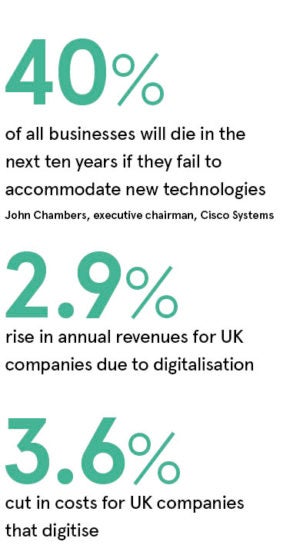
In a bid to leverage fully the potential of recent digital advancements, businesses in virtually all sectors are embarking on digital transformation projects, which are becoming increasingly complex. Although it may be vital to break down information silos within a company, making employees a central part of any transformation strategy is of equal importance.
“Millions can be spent on digital transformation projects, but if an organisation doesn’t train people how to use the technology effectively, it just won’t work,” explains Paul Richardson, head of transformation at SCC, Europe’s largest independent IT group. “Businesses must have the capability to improve end-user adoption. To support transformation everything from user manuals to a full learning management system, including online courses and videos, may need to be created.”
When performed correctly, digital transformation can turn an organisation into a modern workplace and effectively utilise disruptive technologies to enable greater collaboration, whether within the organisation itself or a wider partner network. Datacentre modernisation often lies at the core of digital transformation programmes that are moving companies towards a more agile and dynamic workforce model.
“Digital transformation means different things to different people. What many businesses want is the panacea for the modern workplace. Everything from the Holy Grail of the paperless office to datacentre transformation, building new infrastructure and capabilities in the cloud, and embracing a cloud-first strategy,” says Mr Richardson.
Driven by a desire to move towards more predictable fixed costs and away from expensive, cyclical digital refreshes every few years, digital transformation projects that empower employees to work from any location are on the rise. Working with a knowledgeable and experienced IT partner is essential to guarantee every stage of the transformation journey, from designing a cloud strategy to full implementation, while ensuring alignment with business strategy.
It’s clear to see how digital transformation projects can help a business maintain a competitive advantage. If a business is not on a digital transformation journey, they can be sure their competitors are.
In an age of always-on devices, employees increasingly need to be as mobile as possible and not be constrained by outdated technological infrastructure. As the younger generations enter the world of work, they will want the same frictionless digital experience they get in their personal life, for example a consistent digital experience, including wifi and mobile internet at all times. Companies that fail to offer this experience simply won’t be able to attract the best talent.

It’s just as important to change business processes as it is to transform the technological foundation of a company, with a costly digital rebuild doing little to improve the bottom line if staff aren’t given the freedom to work in a way they feel most comfortable and productive.
According to market intelligence firm IDC, companies are on course to spend $1.3 trillion on digital transformation technologies in 2018 alone, illustrating the willingness of businesses to pay out large sums delivering digital strategies. From companies migrating email into Office 365 to moving all services into AWS or Microsoft Azure, most companies are on some type of journey into cloud services.
Mr Richardson worked with a global manufacturing firm to transform their legacy collaboration platform. Email, instant messaging and video conferencing solutions were all sitting on old infrastructure in highly expensive datacentres, and costing the enterprise dearly.
“We helped migrate services into the cloud that are utilised in 40-plus countries around the globe. This enabled the firm to standardise and consolidate their entire global collaboration platform and remove the issues they used to have because of systems not integrating. The new environment we built for them had a global standard, and enabled them to transform applications and other services on top of the platform to further enable their business,” he concludes.
For more information please visit www.scc.com


